Darkness on the edge of town
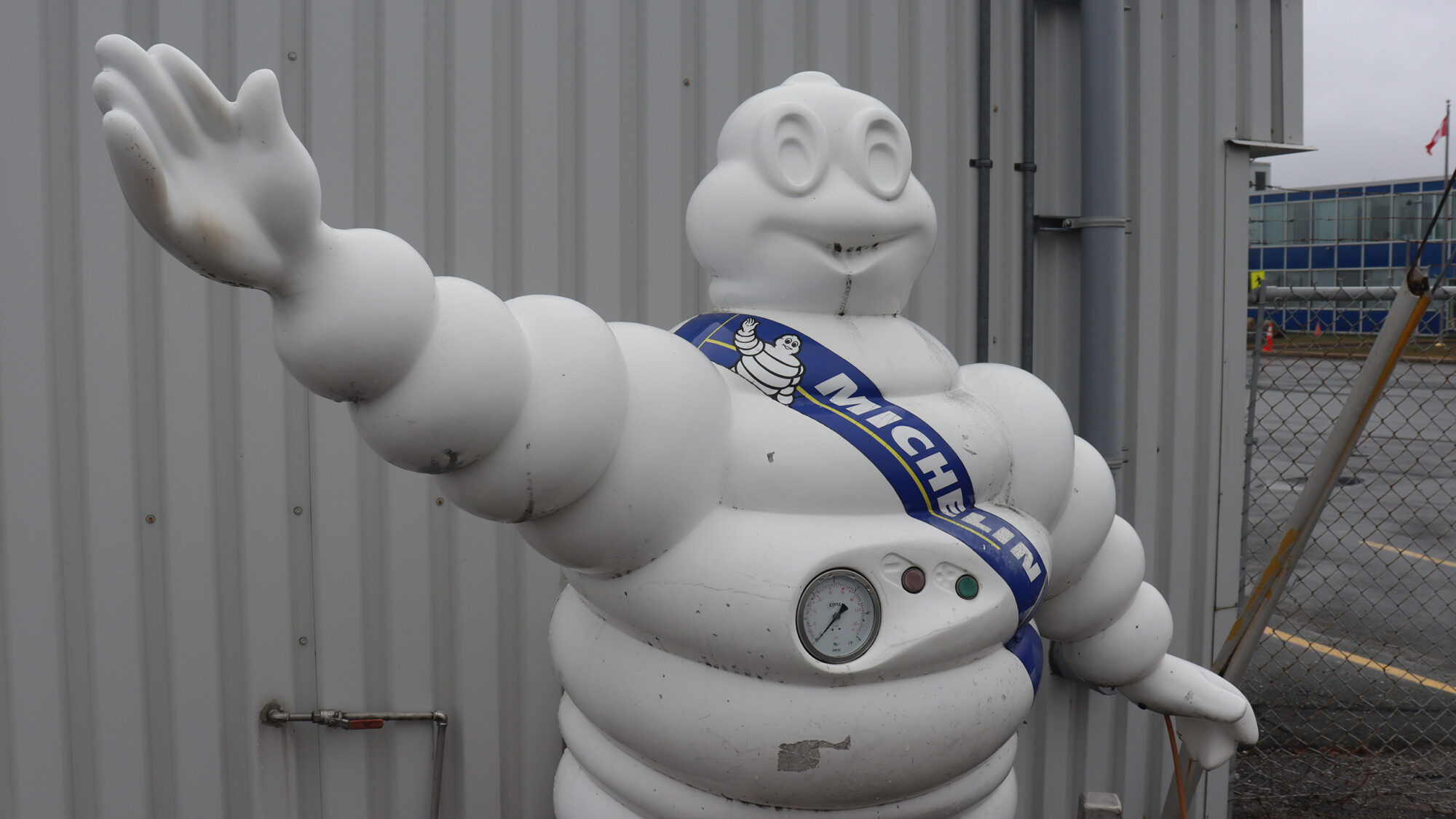
caption
Outside the Bridgewater Michelin factory, a tire inflator shaped like the Michelin Man greets employees.After work, Mal Haley likes to watch the sun rise over the LaHave River in Bridgewater, Nova Scotia. Following 12 hours of intense heat, piercing alarms, and a noxious smell, this is calming.
A town of 8,800, Bridgewater is nestled on Nova Scotia’s South Shore. In a region known for producing top-shelf seafood and in a county that calls itself the Christmas tree capital of the world, Bridgewater makes its bones in a different industry. Tires.
Like a scene from a Bruce Springsteen song, Haley watches sunlight-tinted water charge towards the Atlantic. She’s making her way home from an overnight shift at the Michelin tire factory. Once, the river gave the town life. Today, Michelin keeps Bridgewater afloat.
Haley is exhausted. Twenty-four hours before, she roused her three-year-old son William, took him to daycare and got on with the day’s chores. She hasn’t slept since.
All her life, Haley has called Bridgewater home. She’s worked at the Michelin factory for almost ten years. At 28, one-third of her life has been spent making tires.
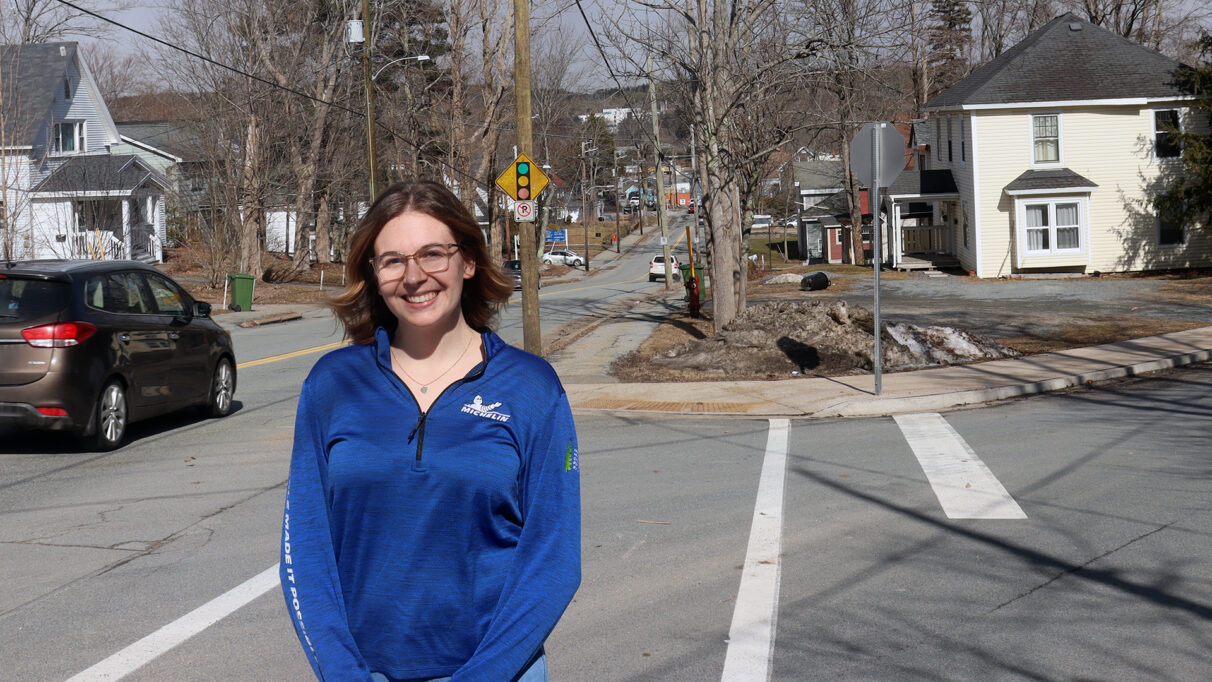
caption
Mal Haley has lived in Bridgewater her whole life.Despite the irregular hours, Haley likes her job. She even prefers working nights. Making a living at Michelin lets her spend time with friends and family – her best friend and uncle both work there. Inside the factory, she manages a crew of five and a 15-foot-tall tire-making machine. The responsibility, though stressful, is satisfying.
But stress has been building since Jan. 20, when Donald Trump was sworn in as U.S. president. He is pressing corporations to move to the U.S., raising concerns that Michelin may go south.
Haley, who has a welcoming smile and natural optimism, lives four minutes from the factory. Finally home, she walks through the front door and pulls off her work boots. William’s toys, organized neatly in bins, are visible from the hall – clearly, he has a particular interest in trucks.
Drained by her long day, Haley “showers and crashes.”
$148,000 an hour
Bridgewater is a company town; 1,270 people work at the Michelin plant. The French king of tires issues cheques to more than 25 per cent of the town’s working-age people.
Every company town, Dalhousie University economics professor Stephane Mechoulan says, is an “ecosystem.” If the company falters, “the entire town suffers.”
The factory – capable of producing 7,500 tires daily – is the centrepiece of Nova Scotia’s manufacturing industry. Rubber, i.e. Michelin tires, is the province’s largest export. In 2021, rubber exports to the United States alone totaled $1.3 billion.
That’s $148,000 worth of tires exported to the United States every hour, all year round.
Half an hour down Highway 103, Liverpool offers Bridgewater a cautionary tale. The Bowater Mersey mill called the area home for 83 years. Then it started bleeding money, forcing Bowater to shutter its windows in 2012.
Liverpool was devastated. The local food bank, within one year, saw an eight per cent increase in users. Over 15 years, Liverpool’s population dropped 7.7 per cent. Within six months of the mill closing, the Nova Scotia government purchased Bowater Mersey Paper Company Limited for $1. The mill never reopened.
Luckily for Bridgewater, Michelin is valued at $35.9 billion. Dal prof Mechoulan believes it can afford to take a financial hit. But it has no obligation to.
Regardless of how much a company is worth, business is business. Or as Michelin might say, les affaires sont les affaires. With tariffs now in place, the cost of exporting to the U.S. from Nova Scotia has increased 25 per cent. If Michelin pulls the plug or slows down production, Mechoulan predicts Bridgewater would experience “a chain reaction of doom.”
For picturesque Bridgewater, Michelin is essential. It’s the reason the town’s motto is The Main Street of the South Shore.
Inside the plant
At 6:15 p.m. the next day, Haley pulls into the plant’s parking lot 45 minutes before she’s scheduled to work. She then scans her key card and passes through a turnstile – one of few gaps in a fence topped with barbed wire. Above the entrance is a sign reading WE MANUFACTURE THE FUTURE.
Haley arrives early because she likes to chat with coworkers in the break room nearest to her workstation (the plant has many). It’s a small space dressed up with chairs, a table, and Michelin rules and terminology from floor to ceiling. The people she sits with are more than friends; she sees them “more than my own family.”
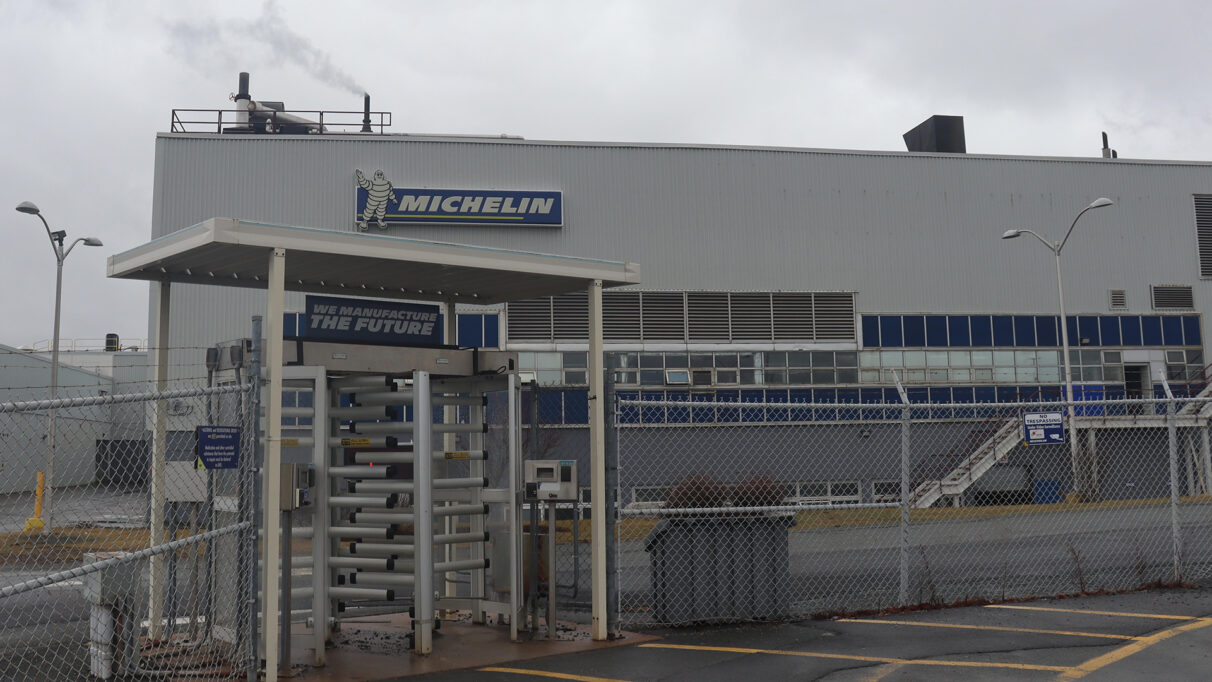
caption
The entrance to Michelin’s Bridgewater factory on an overcast day.Haley has yet to hear tariffs mentioned in the break room. Since their implementation, she’s only heard them discussed once in the plant, a quick point in a brief seven-person meeting. Inside the plant’s well-secured gates, Michelin employees are controlling what they can control. They make tires, not corporate decisions.
Haley isn’t “overly concerned” about the future that Michelin employees proudly manufacture. But she’s aware the situation is volatile. “God knows what could happen in the next few weeks,” she says. Haley trusts higher-ups to sort it out. In the meantime, the tires won’t make themselves.
Growing up, Haley thought of Michelin and Bridgewater as intertwined. Everybody knows it’s a tire town. Her dad’s best friend Deryck Bolivar – Deke, Dekester, or Coach to friends – works for Michelin. Still, she didn’t realize “how many people work at Michelin until you start running into them,” says Haley. “Pretty much any time I go to Walmart, I run into someone from work.”
They poured so much money into our plant. They’ll do their best to keep it open.
Mal Haley
At Michelin, Bolivar was Haley’s first boss. His familiar face, coupled with helpful tips and tricks, made adjusting to a demanding new job a little easier.
In one of her first meetings with the team, Bolivar accidentally referred to Haley by a childhood moniker – Princess. In the factory, the nickname stuck for years. On occasion, she’s still referred to as Princess – in addition to a more recent nickname, Trouble.
As troubling times loom over Canada, Haley remains optimistic. For hope, she looks to Michelin’s investment in Bridgewater. The plant just completed a $300 million expansion; $194.4 million came from Michelin, with the remainder forked over by the Nova Scotia and federal governments. Officially named Hemlock, the project will increase the number of tires produced, reduce the plant’s environmental impact, and create roughly 70 new jobs. Michelin “poured so much money into our plant,” Haley says. “They’ll do their best to keep it open.”
Driving new roads
(A brief diversion… Growing up in Toronto, I lived within a ten-minute walk of two artisan dessert shops and a cheese importer. The closest I ever got to a factory was watching Tommy Boy. I feel compelled to say, with surprise and delight, that the people of Bridgewater are the kindest people I have ever met, anywhere. They are thoughtful, empathetic, and exceedingly caring. They are also unable to conceive of a world without Michelin. Even while learning to exercise professional journalistic distance, it’s hard not to feel for them.)
Francois Michelin – whose obituary in the UK Telegraph says he “insisted on the secrecy of Michelin’s internal affairs” – picked Nova Scotia to be the home of his company’s first foray into North America in 1969 (there are now 34 plants across the continent, 31 in the United States). Today, Michelin North America’s head office is in Greenville, South Carolina – a conservative, Republican state.
Since its arrival in Canada, Michelin has become Nova Scotia’s largest private sector employer and a crucial trading asset. Across the province (which is tied for Canada’s highest poverty rate), 3,600 people depend on the tire manufacturer to feed themselves and their families.
In 2024, Michelin North America was included in Mediacorp Canada Inc.’s list of this country’s Top 100 employers. The company offers all employees a defined-contribution pension, dental coverage, and, after one year of work, 3.8 weeks of vacation – plus free tires.
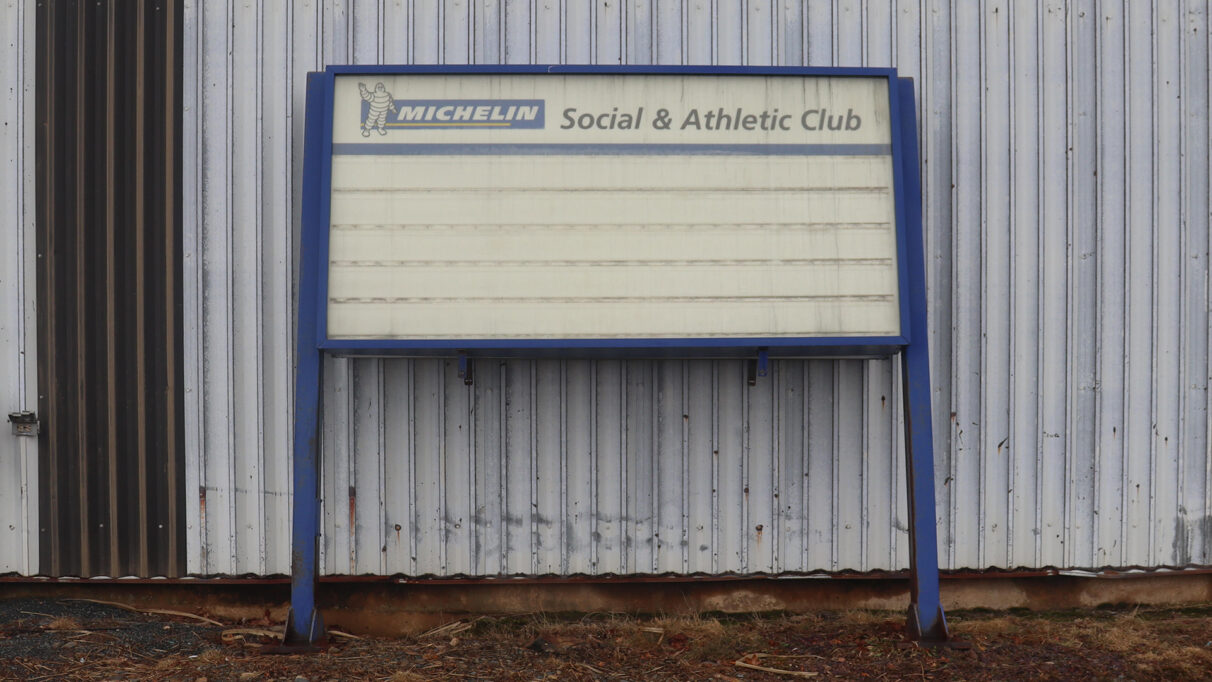
caption
Michelin has been a crucial part of life in Bridgewater for more than 50 years.Its communities and employees like to say that Michelin is generous and accommodating. No mascot appears gentler than the Michelin Man, known since 1894 as Bibendum (derived from the Latin phrase “nunc est bibendum,” meaning “now is the time to drink”). For Nova Scotia’s government, though, when Bibendum comes knocking, you have to answer.
In 1979 – to chants of “SHAME!” in the House of Assembly – a Nova Scotia Conservative government passed an amendment to the Trade Union Act; it became known as the Michelin Bill. The bill decreed that in order to unionize, any company with multiple locations in Nova Scotia must sign up a majority of employees across all locations. The Opposition, media, and public all protested the Michelin Bill.
The bill was drafted during an effort to unionize by employees in Granton, and Michelin is never mentioned – it’s only alluded to. The day after the bill was passed, a new Michelin plant in Waterville was announced.
The Nova Scotia NDP had long declared that if elected it would repeal the Michelin Bill. Once in power, from 2009-2013, NDP Premier Darrell Dexter went back on that promise. He told the press he had “no interest in fighting battles that happened 30 years ago.”
To make sure the company sticks around, the Nova Scotia government has gone to great lengths to appease the Michelin Man. For proof, look no further than Michelin’s initial investment in Nova Scotia. To build the plants, a Nova Scotia Crown Corporation spent more money than Michelin itself.
Right now, Bridgewater is facing more uncertainty than it has in years. The people of Bridgewater are devoted to Michelin. Is Michelin devoted to them?
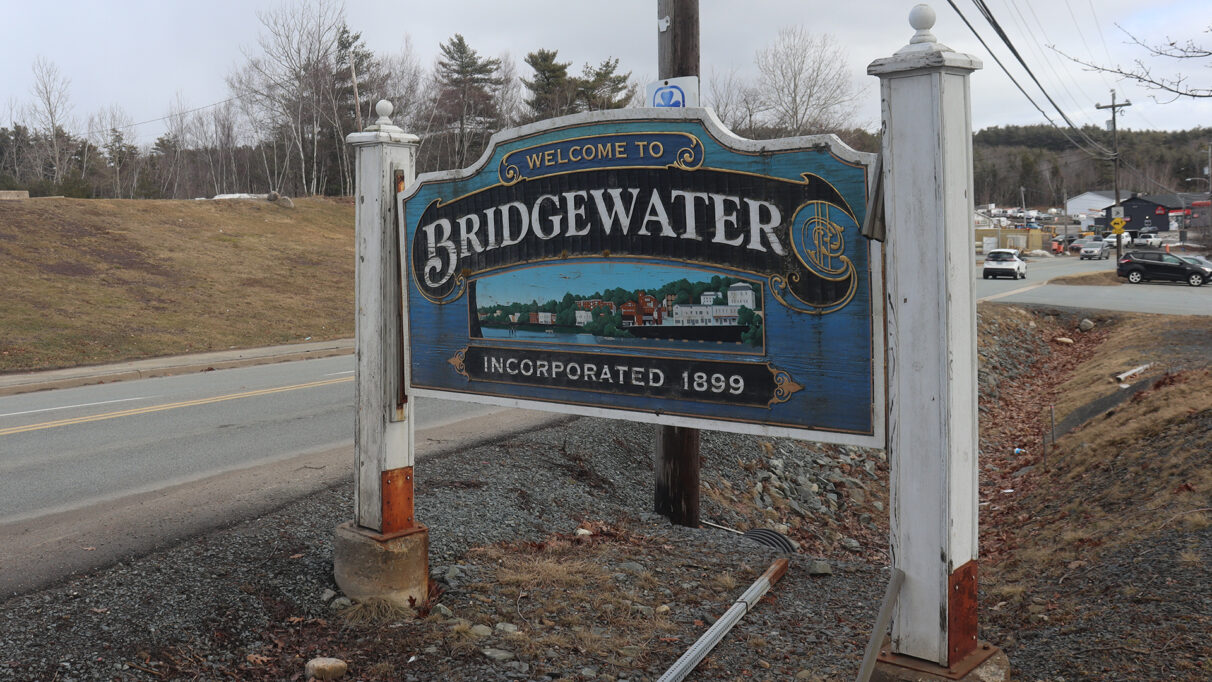
caption
Bridgewater is the largest town on Nova Scotia’s South Shore.The town’s response
Overlooking the LaHave River from his office on Pleasant Street, Bridgewater Mayor David Mitchell says yes: he believes Michelin is devoted to Bridgewater. The threat of a closure doesn’t keep him up at night – he has staunch faith in the company anchoring his small town.
Mitchell is more worried about a production slow-down than a shut-down. For every layoff at Michelin, multiple people would feel the effect. In a trickle-down system, “1,200 jobs is about 8,000 to 12,000 indirect jobs,” he says. Whether it’s the people driving the 100 trucks coming in and out of the plant daily, or the restaurants who feed people in return for dollars earned at Michelin, more than just plant workers would bear the burden.
But Mitchell knows Bridgewater is a resilient town. “This isn’t our first rodeo,” he says. Citing the COVID-19 pandemic and 2008 financial crisis, Mitchell asserts the town and Michelin have “been through this before.”
Mitchell will soon cross the Atlantic to visit Michelin’s global headquarters in Clermont-Ferrand, France – a city founded in the first century BC. He expects Michelin’s top executives to open their conversation by noting how important Bridgewater is to their company. This, he says, they always do.
In France, Mitchell intends to pivot the meetings from his town’s importance to tariffs and how the company might respond. He’s confident Michelin started preparing for them “the day Trump won the election.”
Mitchell likens the current political and economic tension to an animal storing food for the winter. The only difference? The animal doesn’t know if winter is actually coming.
“Do you start tucking away your money and preparing for a slow-down?,” asks Mitchell. “Or is it all a bluff that’s going to go away?”
Editor's Note
This story was first published, in a slightly different form, by cbc.ca on May 25, 2025.
About the author

Connor Parent
Connor Parent graduated this spring with a Bachelor of Journalism (Honours) degree from the University of King’s College.
